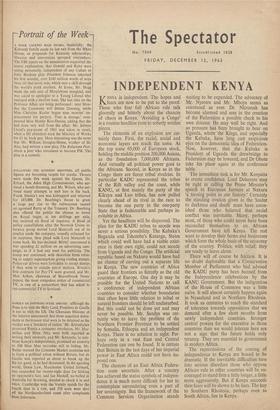— Portrait of the Week— A WEEK LACKING HIGH DRAMA, thankfully
: the_ Kennedy family made its last exit from the White House, as proposals for Kennedy scholarships, libraries and universities sprouted everywhere. The FBI report on the assassination supported the sanest explanation, that Oswald and Ruby were acting personally, independent of any Cuban or John Birchian plot. President Johnson inherited his first scandal, over $140 million worth of soya bean oil that never was, which sent a chill through the world's stock markets. At home, Mr. Hogg made the safe seat of Marylebone marginal, and was asked to apologise to a Young Liberal who emerged with a swollen nose. The last rites on the Profurno Affair are being performed: next Mon- day the Commons will debate Denning, while Miss Christine Keeler began nine months' im- prisonment for perjury. 'Fate is strange,' com- mented Miss Mandy Rice-Davies, adding that she had done very well from the affair. Mr. Selwyn Lloyd's pay-pause of 1961 was' taken to court, when a lift attendant sued the Ministry of Works for £1 6s. back pay. More interesting was the news that Mr. William Douglas-Home, brother of Sir Alec, had written a new play, The Reluctant Peer, about a beer who renounces to become PM. The, play is a comedy.
FOLLOWING THE KENNEDY SHOOTING, all public figures are becoming targets for cranks. Threats
were made this week against the Queen, Dr.
Erhard, the Aden High Commissioner, who sur- vived a bomb-throwing, and Mr. Wilson, who sur- vived many attempts to stab him in the back.
Frank Sinatra's son was kidnapped and returned for £85,000. Dr. Beeching's threat to grant
a large pay rise to the railwaymen caused an agonised flurry at the Treasury. Dr. Beeching also offered the public the chance to travel on Royal trains, at ten shillings per mile, but received no flood of inquiries. A flood of policy cancellations after the Norwich Union in- surance group moved Lord Mancroft out of its employ made the company, roundly criticised for its ineptness, then plead with Lord Mancroft to come back. He has declined. BOAC announced it was spending £2 million on an advertising cam- paign, as if it had any need for publicity. The stamp war continued, with chocolate firms refus- ing to supply supermarkets giving trading stamps. Police-car drivers were forbidden to accept stamps if they went to outside petrol stations. Britain's first contracts for Pay-TV were granted, and Mr. Max Aitken, chairman of Beaverbrook News.: papers, the most outspoken critics of commercial TV, is one of a consortium that has asked to run commercial TV in Scotland.
HARDLY•AN INSPIRING WEEK ABROAD: although the Pope is to visit the Holy Land, President de Gaulle is not to visit the US. The Ghanaian Minister of the Interior announced that three acquitted defen- dants in the treason trial were to be detained as the verdict was a 'mockery of justice.' Mr. Khrushchev promised Russia a consumer revolution, Mr. Mac- millan and Mme. Nhu were both reported* as writing their memoirs, and Mr. Kenyatta, to cele- brate Kenya's indejiendence, promised an amnesty to 500 Mau Mau terrorists still in hiding. Mr. Butler warned the Common Market countries not to form a political union without Britain, but de Gaulle was reported as about to break up the Six for good, as he had threatened. In the sporting world, .Denis Law, Manchester United forward, was suspended for twenty-eight days for kicking an opponent's face, and Ian Meckiff, no-balled in Australia for throwing, decided to chuck it in and retire. Cambridge won the Varsity match for the fourth time in a row, and 350 seals were shot off the Northumberland coast after complaints from fishermen.






































 Previous page
Previous page